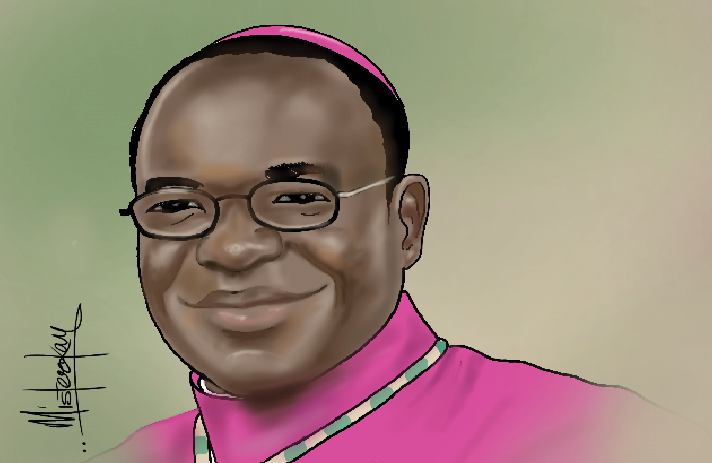In reflecting on Nigeria’s leadership journey, Bishop Matthew Kukah, a Catholic priest, activist, and philosopher, delivers a searing observation: “Almost every leader who came to power did so by accident.” With these words, he stirred a hornets’nest, igniting a spirited discourse on the nation’s perennial struggle with leadership.
Kukah’s critique strikes a resonant chord with voices like former President Olusegun Obasanjo, who has long lamented the opportunistic nature of Nigeria’s leadership selection. It also echoes the trenchant wisdom of Chinua Achebe, who famously diagnosed the nation’s ailment in The Trouble with Nigeria: “The trouble with Nigeria is simply and squarely a failure of leadership.” Achebe’s words, though decades old, still carry the weight of an unheeded warning, underscoring the cyclical nature of Nigeria’s governance woes.
An accidental leader, in its essence, refers to one who ascends to power without adequate preparation, experience, or strategic vision. This phenomenon, while not unique to Nigeria, has become a defining feature of its political landscape. Leaders often emerge through circumstantial opportunities rather than deliberate grooming or merit-based processes. Without the necessary skills for effective governance, they frequently make poor decisions, rely on narrow circles of influence, and fail to address critical national challenges.
Cycle Of Accidental Leaders
Since the dawn of the Fourth Republic in 1999, Nigeria has repeatedly grappled with the consequences of accidental leadership. Umaru Musa Yar’Adua, despite his integrity, struggled with health issues that hindered governance. Goodluck Jonathan admitted he was unprepared when he unexpectedly became President following Yar’Adua’s death. Muhammadu Buhari’s tenure was marked by delays in forming a cabinet and a lack of clear economic direction in his early years, further underscoring the perils of unprepared leadership. At the state level, many governors prioritize political survival over developmental goals, exacerbating local challenges and perpetuating poor policy formulation, resource mismanagement, and lack of continuity in governance.
Governance under accidental leaders often results in short-term thinking, nepotism, and an indifference to the broader national interest. Nigeria’s inability to meet key development indicators underscores these outcomes. Over 40% of the population lives below the poverty line, unemployment hovers at 33.3%, and insecurity claims over 10,000 lives annually due to banditry and insurgency. Such statistics highlight the broader implications of unprepared leadership: systemic issues remain unaddressed, economic growth stagnates, and social cohesion erodes.
In contrast, prepared leaders with prior exposure to governance, leadership roles, or structured mentorship bring clear goals, strategic vision, and the capacity for effective policy execution. They inspire confidence and focus on long-term national development. Global examples such as Singapore’s Lee Kuan Yew, India’s Mahatma Gandhi, and South Africa’s Nelson Mandela underscore how strategic preparation, mentorship, and clear vision can transform nations. Lee Kuan Yew, through decades of planning and merit-based leadership, turned Singapore into an economic powerhouse. Gandhi’s emphasis on nonviolent resistance and Mandela’s post-apartheid reconciliation efforts illustrates the transformative power of prepared leadership. Even in developed democracies like the United States, Joe Biden’s decades of political experience equipped him to navigate complex challenges, including post-COVID-19 recovery efforts.
Root Of Nigeria’s Leadership Crisis
The leadership crisis in Nigeria is rooted in systemic and structural issues. Party structures prioritise loyalty over competence, and electoral processes often reward popularity rather than merit. In the 2023 elections, many officials were chosen based on party endorsements rather than independent credibility or a record of public service. Weak institutions fail to hold leaders accountable, and divisive ethnic and religious politics prioritize sectional interests over national unity. Public apathy compounds these issues; a 2023 Afrobarometer survey revealed that only 34% of Nigerians believe their votes influence governance outcomes, highlighting widespread disenchantment with the political system. This disconnection reduces accountability and enables the emergence of incompetent leaders.
Examining global leadership recruitment systems offers valuable lessons for Nigeria. The United Kingdom’s parliamentary system emphasizes years of experience in lower offices, enabling leaders like Margaret Thatcher and Tony Blair to rise with proven credentials. Similarly, China’s Communist Party systematically grooms leaders over decades, requiring them to serve in various regional and national roles before ascending to top positions. These systems prioritize competence and preparation, in stark contrast to Nigeria’s process, which often favours party loyalty and opportunism over merit.
Thoughts On Leadership Recruitment
Improving the quality of leadership in Nigeria requires a multifaceted approach. Leadership training and development must become institutional priorities. Establishing leadership academies, such as the proposed National Institute for Leadership Development, could help build competence. Incorporating leadership education into school curricula and creating mentorship programs would establish a pipeline of skilled leaders. Institutional reforms are critical, including strengthening electoral integrity to prioritize merit-based selection and adopting transparency mechanisms to evaluate candidates’ preparedness. For instance, implementing primary debates, as seen in the U.S., could help assess policy depth.
Citizen engagement is equally vital. Educating the public on the importance of leadership quality and encouraging active participation in political processes can drive demand for visionary leaders. Addressing public apathy is essential; a more engaged electorate can hold leaders accountable and push for systemic reforms. Leadership development must also extend to the grassroots, fostering young politicians and equipping them with the skills necessary for effective governance.
The debate on whether leadership is innate or learned underscores the importance of structured training. While some argue that leadership is a natural trait, global systems like Singapore’s meritocratic model and Britain’s parliamentary process demonstrate that systematic preparation enhances governance effectiveness. In Nigeria, where many leaders lack both innate qualities and formal training, creating platforms for leadership grooming is crucial. State-level training programs for young politicians and public servants could bridge this gap, fostering a generation of leaders better equipped to tackle Nigeria’s complex challenges.
Bishop Kukah’s assertion about accidental leadership underscores a fundamental issue in Nigeria’s governance: the prevalence of leaders emerging from flawed recruitment processes that favour expediency over competence. This phenomenon has entrenched systemic challenges, as unprepared leadership often leads to poor governance. Global examples illustrate the transformative impact of prepared leaders, emphasizing the need for deliberate efforts to groom capable individuals.
For Nigeria to transcend the quagmire of accidental leadership, it must embrace transformative change. Leadership development, political reform, and citizen participation are non-negotiable pathways to cultivating visionary stewards. By prioritising competency, character, and purpose, the nation can break free from its cycle of underdevelopment and realise its full potential.





